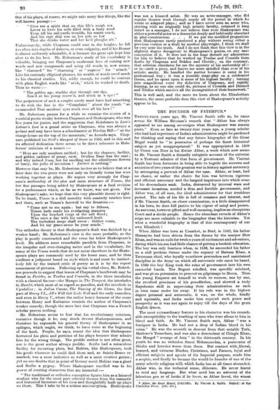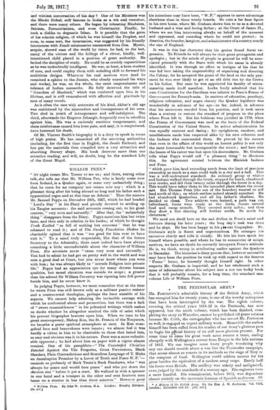THE FOUNDER OF FATELIPITR..
Twassre-roca years ago, Mr. Vincent Smith tells us, ho came across Sir William Sleernan's remark that "Akbar has always appeared to me among sovereigns what Shakespeare was among poets." Even so late as twenty-four years ago, a young scholar 17110 had had experience of Indian administration might be pardoned for thinking and saying that any future biographer of the Great Mogul would be "in possession of perhaps the finest historioal subject as yet uneppropriated." It was appropriated in 1S90 by Count von Neer in Isis Kaiser Akbar, a work which now seems to Mr. Vincent Smith a dismally eulogistic account of the autocrat by a Teutonic admirer of that form of government. Mr. Vineent Smith has been fortunate in being able to beguile the sorrows and anxieties of two years of the greatest war in history against antocrany by attempting a portrait of Akbar the man. Akbar, at least, had no choke, or rather the choice for him was between vigorous and efficient autocracy and the languid impotence into which some of his descendants sank. India, distracted by internal ware and incessant invasiona, needed a firm and forcible government, and Akbar was, of all men, the ideal administrator for that troublous period. The tale of his life is full of romance and interest, and if Hr. Vincent Smith, on closer examination, is a little disappointed in his hero, he dam full justice to his vigour of initul and person. An autocrat, however gifted and well meaning, implies an obsequious Court and a docile people. Hence the abundant records of Akbiles reign are more valuable to the biographer than the historian. Yet what a wonderful biography is that of this contemporary of our own Elizabeth I When Akbar was born at Umarkot, in Bind, in 1542, his father Humayun had been driven from the throne by the usurper Sher Khan, and was an exile for twelve years of excitement and adventure, during which his son had little chance of getting a bookish education. The boy was only fourteen when, in 1555. Ise succeeded his father on a still perilous throne under the regency of Bairam Khan, a Tureen= chief, who loyally overthrew pretenders and maintained discipline in the Army on which all autocratic rule must be based. In 1500 the boy King took the reins of government into his own masterful hands. The Regent rebelled, was speedily subdued, and was given permission to proceed on pilgrimage to Mecca. Then the young Emperor set himself to work to recover, one by one, the revolted provinces of his grandfather, and showed a truly Napoleonic skill in supervising their administration as each in turn came under his sway. If his rule was in the highest, degree personal and autocratic, it was, on tile whole, kindly and equitable, and India under him enjoyed such peace and prosperity as it was not again to enjoy till the days of the great English Queen.
The most extraordinary feature in his character was his remark- able susceptibility to the teaching of men who were aliens to him in blood and faith. As Mr, Vincent Smith says, Akbar "was a foreigner in India. He had not a drop of Indian blood in Isis veins." Ho was the seventh in descent from that notable Turk. Marlowe's Tamerlane, and was also a descendant of C'hingiz 101411. the Mongol "scourge of Asia" in the thirteenth century. In his youth he was an orthodox Sunni Mohammedan, a persecutor of Shialts and heretics worse than these. But contact with liberal, learned, and virtuous Hindus, Christians, and Parsecs, loyal and efficient subjects and agents of his Imperial purpose, made him a sceptic, and finally he became the wouldLe founder of one of the many eclectic religions with which India has at all times abounded. Akbar was, in tho technical sense, illiterate. He never learnt to rend any language. But what need has an autocrat of the laborious pen or of books if he loves, as Akbar loved, the wisest • 4490r, the area Mogul, 15424605. Dy Viaceat A. Smith. Oxford: at this Clareialoa Ittas. Ilea. nat.! sod witrieet, ocesvereetion of his day r One of his Ministers wee- the Hindu Birbal; salt herlIOU, in India es a wit and raconteur, and there were many others. He began by tolerating Hinduism, Jainism, Zoroastrianism, and even Christianity. Finally, he Look a dislike to dogmatic Islam, It is possible that. the germ of his. eclectic religion, of which he was himself the Prophet; and oven, in some sort, the incarnation, was suggested by his friendly intercourse with Jesuit missionaries summoned from Goa. Mystic, aseptic, shrewd man of the world by turns, he had, to the last, many of the virtues and the failings of a clever, kindly, well- intentioned- child placed in & position of great authority. He lacked the discipline of study. He could be co crudely superstitious as he was undoubtedly intelligent.. He was, at least, a keen student of men, and could employ them with unfailing skill to forwardthis ambitious deeigne. Whatever his real motives were (and. he remained a sphinx to the Jesuits, who closely examined, his ways and works), he was, on the whole, the most magnanimous and tolerant of Indian monarchs. He fully deserved the title of " Guardian of Mankind," which was conferred upon him in his lifetime, and is still remembered with affection and gratitude by men of many creeds.
As is often the case wit,h autocrats of his kind, Akbar's old age was embittered by the misconduct and incompetence of his sons. Two died in youth of intemperance and self-indulgence. The third, afterwards the Emperor Jehangir, frequently rose in rebellion against him. His was a curiously sensitive temperament, and these misfortunes caused him keen pain, and may, it is conjectured, have hastened his death.
Of Mr. Vincent Smith's biography it is a duty to speak in terms of high praise. He has ransacked all the surviving authorities (including, for the first time in English, the Jesuit Fathers), and has put the materials thus compiled into a very attractive and absorbing literary shape. His book deserves more than one attentive reading, and will, no doubt, long be the standard Life of the Great Mogul.



































 Previous page
Previous page